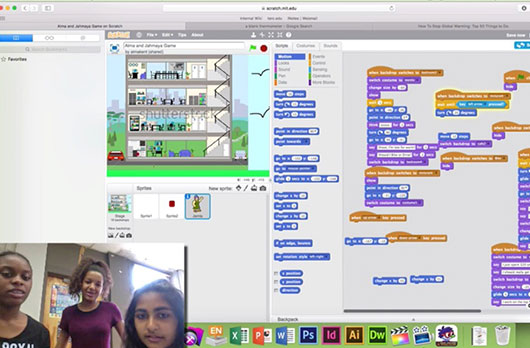Research and Publications
The Building Systems from Scratch project developed and studied our education program which integrates computing into middle school Earth science classrooms by interweaving game design, computational thinking, and science content learning. Our goal was to create a truly integrated learning experience that focused equally on climate science, computational thinking, and game design. We conjectured that students learn these practices and content better by building games than by direct instruction or by student inquiry alone.
The project worked with fifteen 8th grade teachers in three school districts (two in MA and one in OH) across three years. The effort reached approximately 1,840 8th grade students, approximately half of whom are from groups underrepresented in STEM fields. Implementation is complete after 3 years.
See below for our findings about student learning, assessment of game artifacts, and science teachers’ experiences in teaching computational thinking.

Publications
Puttick, G., Cassidy, M., Tucker-Raymond, E., Troiano, G. M., & Harteveld, C. (2023). “So, we kind of started from scratch, no pun intended”: What can students learn from designing games?Journal of Research in Science Teaching, 1–37. https://doi.org/10.1002/tea.21918
Tucker-Raymond, E., Cassidy, M. & Puttick, G. (2021). Science teachers can teach computational thinking through distributed expertise. Computers and Education, 173.
Cassidy, M., Tucker-Raymond, E., & Puttick, G. (2020). Distributing expertise to integrate computational thinking practices. Science Scope, 43(7), 18-21.
Troiano, G., Chen, Q., Vargas Alba, A., Robles, G., Smith, G., Cassidy, M., Tucker-Raymond, E., Puttick, G. & Harteveld, C. (2020). Exploring How Game Genre in Student-Designed Games Influences Computational Thinking Development. Proceedings of the Annual Symposium on Computer-Human Interaction in Play (CHI’20, April 25-30, 2020, Honolulu, HI, USA). The Association for Computing Machinery (ACM).
Tucker-Raymond, E., Puttick, G., Cassidy, M., Harteveld, C. and Troiano, G.M. (2019). “I Broke Your Game!”: critique among middle schoolers designing computer games about climate change. International Journal of STEM Education, 6, 41-57.
Troiano, G., Snodgrass, S., Argimak, E., Robles, G., Smith, G., Cassidy, M., Tucker-Raymond, E., Puttick, G. and Harteveld, C. (2019). “Is My Game OK Dr. Scratch? Exploring Programming and Computational Thinking Development in Student-Designed Games.” Proceedings of the 18th ACM International Conference on Interaction Design and Children, Boise ID, June 2019, pp. 208-219.
Puttick, G., Troiano, G., Cassidy, M., Tucker-Raymond, E., Harteveld, C. & Smith, G. (2018). Exploring how student designers model climate system complexity in computer games. Proceedings of the 2018 Connected Learning Summit, Cambridge MA, August 2018, pp. 196-204.
Puttick, G. & Tucker-Raymond, E. (2018). Building systems from Scratch: An exploratory study of students learning about climate change. Journal of Science Education and Technology
Puttick, G., Tucker-Raymond, E. & Barnes, J. (2017). Young people designing games about climate change. Hands On! Fall/Winter 2017, 7-9.
Puttick, G., Tucker-Raymond, E. & Barnes, J. (2017). Environmental attitudes in youth-created computer games about climate change. Proceedings of the Games+Learning+Society 12 conference, August 2016, Madison WI.
Hoover, A.K., Barnes, K., Fatehi, B., Moreno-Leon, J., Puttick, G., Tucker-Raymond, E. & Harteveld, C. (2016). Assessing Computational Thinking in Students’ Game Designs. Proceedings of the Annual Symposium on Computer-Human Interaction in Play (CHI PLAY. The Association for Computing Machinery (ACM). Special Interest Group on Computer-Human Interaction (SIGCHI).
